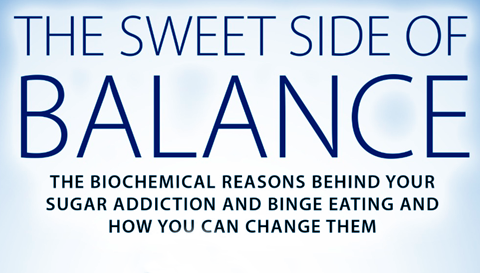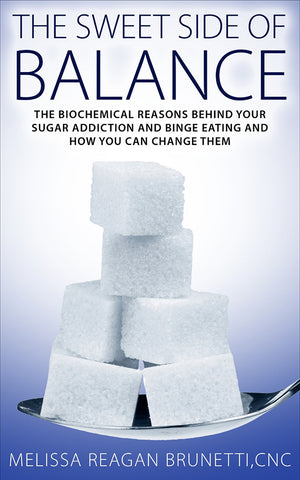Melissa Reagan Brunetti, certified nutrition consultant, advanced sports and exercise nutrition advisor, and author of The Sweet Side of Balance, helps us understand what can cause compulsive overeating and sugar addiction and offers suggestions for overcoming these issues.
Your philosophy is that compulsive overeating and sugar addiction are indications that our bodies are crying for help and are craving homeostasis. Will you explain this further and discuss the benefits of solving these issues.
Yes, compulsive overeating or sugar addiction is the body’s cry for help; it is a last-resort attempt to obtain a temporary state of balance. Although we may never fully reach homeostasis due to factors we cannot control, doing all we can to influence the factors we can control will help us to come pretty close. We are always going to be in a state of re-centering. There will always be incidents that throw us off balance—when we are faced with a stressful event, a sleepless night, or feel under the weather—but when we understand how these can impact physical reactions in the body, we can be better prepared and lessen their impact.
All our ailments are interconnected. Solving compulsive eating or sugar addiction can often have a ripple effect and heal other symptoms from which you are suffering: mood swings, muscle aches, sleeplessness, and hormone imbalances.
Feeling more energetic, sleeping better, and improved mood are some of the first positive outcomes of starting a nutrition plan designed to tackle these health challenges. After the first meeting, many clients feel a weight has been lifted off their shoulders.
Sadly, many people are treated as if their overeating and sugar addiction demonstrate a lack of willpower. Will you share how biochemical factors can actually play a major role in this issue?
Yes, nutrients are needed to precipitate and complete reactions in the body. Biochemical processes such as blood sugar regulation, sleep, production of energy, hormone regulation, and formulation of neurotransmitters (our “feel good” chemicals) are dependent upon nutrients. If these nutrients are not available due to diet, absorption issues, or other factors, these processes will be disrupted.
Let’s compare this concept to making banana date bread. If the recipe calls for dates and we don’t have dates, we will get a subpar result. If we are missing an even more important ingredient such as baking soda, the bread will fail to rise and the bread-making process is ineffective. The same thing happens in your body when you don’t have the nutrients available to effectively carry out functions within your biological systems. Lack of energy, low blood sugar, imbalance of hormones, disruption in sleep patterns, and diminished neurotransmitters can all lead to sugar cravings and binge eating.
In your book, you suggest that nutritional deficiencies can lead to dependence. Are there specific nutrients that you find are low in many people? Does addressing these shortages often help balance hunger and food intake?
Addicts tend to have low levels of many vitamins and minerals. Diets high in sugar and other processed foods compound the deficiencies. Zinc, magnesium, B6, B9 (folate), and B12 are some of the most critical nutrients because of their expansive role in so many processes including blood sugar regulation, stress regulation, production of energy, hormone production, detoxification, digestion, and formulation of neurotransmitters.
Our brain is nearly 60 percent fat; fatty acids are among the most crucial molecules that determine your brain’s integrity and ability to perform. They are also needed for production of hormones—increasing essential fatty acids can have a positive impact on mood and addictions. Amino acids are converted and combined with cofactors in the body to formulate neurotransmitters, so ensuring that you are taking in adequate amounts of both animal- and plant-based protein is also important for brain health.
When we look at nutrient availability, we can not only look at what you are taking in through diet or supplements, but we need to discern how your body is able to utilize and metabolize those nutrients. Gut health and the state of the microbiome is critical in the breaking-down process of nutrients. Inflammation or toxic overload can inhibit nutrient transportation, so nutrients do not get to where they need to go.
Genetic variants or mutations can also play a role in how our body absorbs certain nutrients. By understanding the genetic variants we possess and whether or not they may be contributing to our symptoms, we can tailor our diet to support these variants nutritionally to minimize their expression.
In The Sweet Side of Balance, I go into detail on how to address the components hindering nutrient availability.
You state that not only diet, but also genetics, physical and emotional stress, blood sugar regulation, and the body’s ability to detoxify all play a role in nutrient availability. Will you expound on this?
Yes, stress and diets high in sugar can have the same physiological response in the body. When the body faces stress, whether it be from emotional stress from work, financial stress, losing a job or getting a divorce, or physical stress from over-exercising, dieting, sleeplessness, or inflammation in the body, the adrenals secrete cortisol. As the body prepares for the fight/flight response, the body is flooded with glucose to supply an immediate energy source to the muscles. Now you have not only spiked your cortisol, but blood sugar is raised—and then your hypothalamus sends a message to your pancreas, which responds by sending in insulin to remove the sugar. After the sugar is removed, you can experience low blood sugar symptoms, which can cause cravings for sugar.
We are over-secreting insulin and cortisol in order to handle the extreme amount of stress being placed on our bodies. This constant release of cortisol and insulin will cause inflammation in the body, which is going to affect nutrient availability.
In addition, toxins in your body can block nutrients from getting to where they need to go. They can create an environment that is conducive to the proliferation of yeasts and other unwanted microorganisms. Toxins, stress, alcohol, medications, and sugar can quickly deplete the body of nutrients such as zinc, magnesium, and B vitamins. Once again, if you don’t have the nutrients available, this will disrupt blood sugar regulation, breaking down of macronutrients, creation of hormones that regulate appetite and metabolism, and production of cellular energy. Some genetic mutations affect the ability to absorb certain nutrients.
Will you recommend some simple but achievable changes we can make in our lives to address overeating and sugar addictions?
The first thing you have to do is to stop blaming yourself. The constant shame, guilt, and barrage of self-deprecating thoughts only magnify a challenge that is already difficult to overcome. I hope that by bringing to light the biochemical factors that can lead to binge eating or sugar addiction, you are able to emancipate yourself from this thing that has had a hold on you for so long.
Here are some simple changes you can make:
1.Start a food journal. This is extremely important, not to measure everything you are eating, but as a self-discovery tool. Writing down what you have eaten during the day and how you felt after eating or in between meals will help to identify the factors that provoked a binge. Did you go too long without eating? Did you over-exercise or not get enough fat and protein in your diet that day? Did external stress play a role?
2. Increase essential fatty acids (coconut oil, grass fed butter, olive oil, nuts, seeds, wild fish).
3. Remove artificial sweeteners; they can increase sugar cravings and have a negative impact on weight and gut health.
4. Increase foods rich in magnesium, zinc, and B vitamins (leafy greens, grass fed red meat and poultry, wild fish, nuts, seeds, lentils, beans).
5. Focus on improving gut health. Gut health is extremely important, and this is usually the first step I take with my clients.
- Probiotics are always recommended, either through food, yogurt, fermented vegetables, kefir, or multi-strain and dairy free probiotics.
- Increase vitamin C-rich foods. They help your body to produce enough collagen to maintain the tissues of your digestive tract. Most fruits and vegetables contain vitamin C. Strawberries and red peppers are particularly rich sources.
6. Manage blood sugar and stress.
- Don’t go too long between meals and restrict calories.
- Have a protein-rich breakfast.
- Don’t engage in over-exercising.
- Take walks, yoga, or meditate to reduce stress.
7. Detoxify: the detoxification process can be as important, or more important, than nutrition itself.
- Increase fiber-rich foods (whole grains, lentils, split peas, apples, broccoli, Brussels sprouts, apples).
- Start the day with lemon water; sip lemon water throughout the day.
- Brazil nuts—1 or 2 daily. They are a great source of selenium, which is a critical nutrient in the detoxification process. Selenium can be toxic in large amounts.
In my book, I expand on the biochemical reasons for sugar addiction and binge eating and include strategies and recipes to enhance the function of the body and mind.
We thank Melissa for sharing this important information and encourage you to take a look at her insightful book, The Sweet Side of Balance.
___________________________________________________________________________________________
Dana Rutscher is the Practitioner Relations Manager at Hyperbiotics and possesses a vast and ever-expanding wealth of microbial health knowledge. With a graduate degree from Baylor University and a passion for helping others, Dana incorporates her enthusiasm for health and scientific discoveries into her professional pursuits and parenting. For more ideas on how you can benefit from the power of probiotics and live healthier days, be sure to subscribe to our newsletter.


